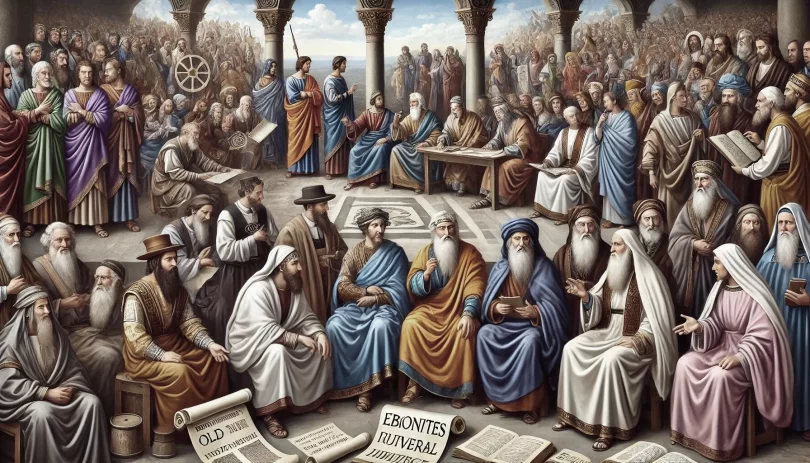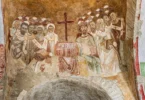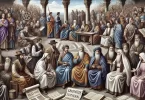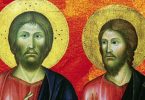The diverse and sometimes conflicting early Christian groups that shaped what we now know as Christianity today.
by Tanner the Humanist.
Despite the numerous denominations and independent churches that exist today, early Christianity was even more diverse. It was far from a neat and tidy system with shared doctrines. Instead, it was a chaotic mix, with various groups holding differing ideas about who Jesus was, what he taught, and what his teachings meant.
The Christian Jews
First off, you had the Christian Jews, without whom there would have been no Christianity today. These folks were the original followers who saw Jesus as the Jewish Messiah, sent to save Israel. They stuck to Jewish laws — kosher diets, Sabbath rules, circumcision, the whole shebang. To them, Christianity wasn’t a new religion but a sect of Judaism. But when non-Jews (aka Gentiles) started joining, things got awkward. Since Jesus never suggested otherwise, the Christian Jews wanted everyone to follow Jewish rules, but most Gentiles weren’t about that life.
These tensions are detailed in the Book of Acts and Paul’s letters (like Galatians). For example, in Acts 15, the Council of Jerusalem debates whether Gentiles need to follow Jewish laws.
The Christian Gentiles
Then you had the Christian Gentiles who wanted to ignore Jewish laws, claiming Jesus died for everyone, not only for Jews. They didn’t care about kosher diets or circumcision but focused on Jesus’ death and resurrection as a cosmic event that saved humanity. Evidently, these guys eventually outnumbered the Christian Jews and started shaping Christianity into what we recognize today.
Paul’s letters — especially Romans and Corinthians — show how he preached a law-free gospel to the Gentiles. For example, Romans 3:28: “For we maintain that a person is justified by faith apart from the works of the law.”
Interestingly, the twelve witnesses hand-picked by Jesus while he was alive were against Gentiles abandoning all Jewish laws. However, the winner was the self-proclaimed apostle who allegedly had visions from Jesus, although he was not chosen by Jesus as an apostle, despite being around.
The Gnostics
Gnosticism was a complex and diverse set of beliefs deserving a detailed exploration in its own right. For now, here’s a quick summary.
You could think of the Gnostics as the hippies of early Christianity, focusing on secret knowledge (gnosis) that they believed could liberate the soul.
Many believed in the Demiurge, a lesser god who created the flawed material world, but not all saw this figure as evil; some thought it was just ignorant or misguided. They generally thought the material world was a mess, something to escape from, unlike mainstream Christianity, which saw the world as God’s good creation.
When it came to Jesus, Gnostic views varied widely. Some said Jesus was a purely spiritual being who only looked human, while others thought he had a body but was more about delivering secret knowledge. His humanity wasn’t the main focus for Gnostics; it was more about the hidden wisdom he brought to help people escape the material world.
Opinions on the crucifixion were just as scattered. Some Gnostics believed Jesus was crucified but saw it as part of a deeper, mystical story or even an illusion. Others didn’t think it mattered or outright denied it happened. For them, Jesus’ teachings and the hidden knowledge were what really counted, not the physical events of his life.
The Marcionites
Then there were the Marcionites, followers of a fellow named Marcion. He thought the God of the Old Testament was a jerk — angry, petty, and obsessed with rules. Marcion said Jesus’ dad was a totally different God, a loving one who wanted to save us from the Old Testament bully. He even put together his own Bible, tossing out anything that smelled like the Old Testament.
Tertullian, a church father, wrote extensively against Marcion, calling him a heretic. But Marcion’s ideas were popular for a while, especially in the 2nd century. His Bible included only edited versions of Luke and some of Paul’s letters.
The Montanists
Next, we’ve got the Montanists. They were all about the Holy Spirit and believed God was still sending messages through prophets. Montanus, their leader, claimed to speak directly for God. These folks were hardcore, preaching end-of-the-world vibes and telling everyone to get their act together.
Eusebius, an early church historian, called Montanism a dangerous heresy. However, they influenced later Christian movements like Pentecostalism, which also emphasizes the Holy Spirit and prophetic gifts.
The Ebionites
Let’s not forget the Ebionites. They were Christian Jews who thought Jesus was the Messiah but not God. To them, Jesus was a prophet and a great teacher, but the whole “Son of God” thing a stretch. They also stuck to Jewish laws, making them even more of an outlier as Christianity became more Gentile-friendly.
Church fathers like Irenaeus and Epiphanius wrote about the Ebionites, describing them as stubbornly clinging to the law. Their version of the Gospel of Matthew was likely stripped of anything suggesting Jesus’ divinity.
The Arians
Fast forward a bit, and you get the Arians. These guys were all about saying Jesus wasn’t equal to God the Father. They thought Jesus was more like God’s right arm. The mainstream church hated this idea so much they called a big meeting (the Council of Nicaea) to squash it.
The Nicene Creed, which came out of this council in 325 CE, declared that Jesus was “of the same substance” as God. However, Arianism stuck around for centuries, influencing Gothic and other barbarian tribes.
The Winners Write History
By now, you’re probably wondering: what happened to all these groups? Well, the ones who got labeled “heretics” mostly faded away, either squashed by the church or forgotten over time. The Catholic Church and, later, the Eastern Orthodox and Protestant branches became the big dogs of Christianity. They decided what was “true” Christianity and what wasn’t.
Before You Go
Basically, early Christianity was a wild mess. There were all these groups around with different takes on Jesus and what he was about. The Christian Jews were trying to keep it kosher, the Gentiles wanted none of that, and the Gnostics were off in their own spiritual world. The Marcionites thought the Old Testament God was a tyrant, the Montanists were hearing voices from God, the Ebionites kept Jesus as just a guy, and the Arians saw Jesus as God’s sidekick. In the end, the church labeled most of them heretics and wiped them out, leaving the winners to write the story we hear today.
Comments:
Russell
“non-Jews (aka Gentiles)”
This might be a misunderstanding.
Christian apologists make no attempt to account for the 80% (or so) of Jews who lived in the Diaspora. They assume this vast majority of Jews were completely uninvolved while a new Jewish-flavored faith became popular among only their non-Jewish neighbors, and was for some strange reason of no interest to actual Jewish people outside of the Levant. The majority of first century Jews were not involved.
How much did Diasporan Jews buy into Torah, being assimilated into foreign cultures? They would have been the perfect market for the new fledgling faith, but the new faith leaped from one ethnic group to many others, with the originating ethnic group left out completely. The reason? Miracles!
Told ya so! Believe and don’t question unless you don’t want to fall in line.
In practice, missionizing is not a very effective tool for conversion. Sexual relations – marriage and parenthood – are the main reasons for having or adopting a religion. Don’t be an apologist, Tanner.
Acts of Faith, Stark and Finke. Essential read. The Rise of Christianity, Rodney Stark. You will find these very helpful for your work. Sociology explains human behavior. Religion has a little to do with sacred texts and philosophical ideas. It is a social behavior.
Trump was inaugurated today. Religion is a problematic human behavior. It’s gonna get worse. What are we gonna do? Apologize?
Del Baker
Great summary of some of the early Christian sects. Thanks!







